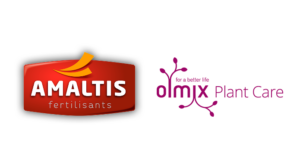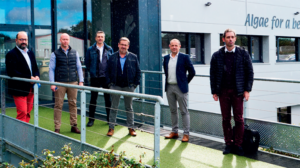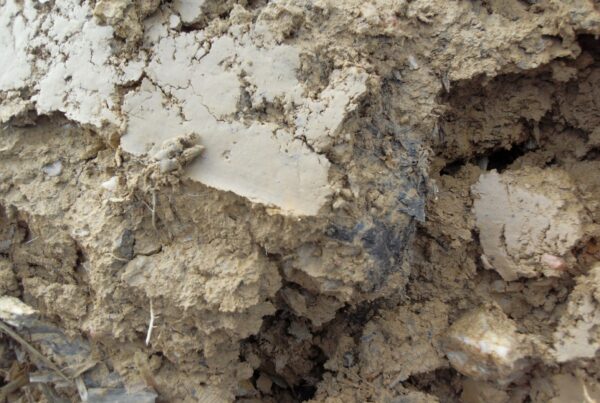Improving fertiliser efficiency while stimulating soil life and crop rooting: this is the aim of the partnership between two specialists: Amaltis – specialist in tailor-made fertilisers and Olmix – designer of soil and plant biostimulation technologies. The two French companies have joined efforts create NATIVA®, a range of fertilisers incorporating a soil microflora activator.
A response to the challenges facing Europe
The agro-ecological transition imposes changes in cultivation techniques in order to reduce their environmental footprint, while ensuring the quantity and quality of production. This necessity also applies to fertilisation which must improve its record. As a reminder, the ambition of the European Green Deal is to reduce the use of fertilisers in Europe by 20% by 2030. This objective involves the deployment of new technologies to make better use of each of the fertilising units available to the plant. It is around this objective that the two companies Amaltis and Olmix have pooled their expertise to give rise to the NATIVA® range.
Committed actors
For several years, Olmix has been developing root biostimulants, notably around its mineral technology MIP® RHIZO – Mineral Inducer Process.
This technology stimulates the enzyme activities developed by microorganisms naturally present in the soil and thereby improves the transformation and availability of nitrogen and phosphate compounds, while promoting root growth.
Amaltis is not at its beginnings in terms of innovation: urease inhibitors, polymer coatings, nitrification retardants, fertiliser with microbial additive… there are many initiatives to improve fertiliser efficiency and reduce the environmental impact of fertilisation.

A new offer to support the agro-ecological transition
The aim of the NATIVA® range developed by the two partners is to maximise the ratio Harvested yield /kg of fertiliser provided, by improving the functioning of biological factors involved in the absorption of fertilisers by the plant. For this purpose, NATIVA® acts on the functionalities of the microorganisms naturally present in the soil.
Indeed, microbial processes are involved in nitrogen and phosphorus mineralisation, but also in nitrification. Likewise, symbioses between soil microorganisms and plant roots are numerous and play an important role in feeding the crops.
NATIVA® therefore has the particularity of combining the supply of nutrients for the plant and a soil microflora activation «key». The result is an increase in the amount of nitrogen and phosphorus mineralised and available to the plant, as well as an amplification of root growth for a better uptake of minerals and water by the crops. Several trials were conducted with partners in France, the Netherlands and Germany on wheat, winter barley, maize and potato crops to measure the performance of the MIP® RHIZO technology.

For equivalent fertilisations, the yield is improved by an average of +8.5%.
For equivalent yields, the reduction in fertiliser quantities can reach 22%.
Why NATIVA®?
The use of the potentials of the microflora native to the soil is an important parameter. « Native » means that only the microflora endemic to the soil is implemented, with no supply of exogenous microorganisms. This native microflora is not there by chance: it is the result of a natural selection that has retained the populations best adapted to the local pedoclimatic context.
NATIVA® enhances the terroir
By stimulating the biological processes specific to each plot, and by enabling the plant to spread its root system more densely and deeply, NATIVA® makes it possible for the crop to take full advantage of the characteristics of the soil, subsoil and climate, particularly the hydric regime… in short, to make the best use of its soil.
An industrial, commercial and agronomic partnership
Each formula consists of a nutritional balance of primary nutrients (NPK), secondary nutrients (Ca, Mg, S) and trace elements, adapted to the targeted crops, and the active ingredient MIP® RHIZO, which stimulates the enzyme activities of the soil microflora. In practice, Olmix develops and delivers the MIP® RHIZO technology in ready-toblend granular form from its Bréhan factory in Morbihan to the Amaltis industrial site of Parthenay in Deux-Sèvres.
Amaltis then incorporates the MIP® RHIZO ingredient in the formulae of the NATIVA® range, based on the various raw materials in its catalogue, and according to the needs of its customers. The formulae offered cover the needs of a wide range of production among field crops, forage crops, vine, as well as sports turf. The marketing is ensured by Amaltis through its customer and distributor network, with the technical support of Olmix teams in the field to provide customers with comprehensive expertise in the field of soil biostimulation.
Several thousands of hectares will benefit from the NATIVA® range as early as this spring 2021!

From left to right : Luc Marquis and Denis Le Fevre – Amaltis Sales Representatives, Didier Blin – Olmix Plant Care Marketing Manager, Gilles Duquesnoy – Amaltis General Manager, Fabrice Pichon – Olmix France Sales Manager and Jérôme Alix – Olmix Product Manager in charge of soil biostimulants.
Amaltis specialises in the trade of fertilisers and the development of tailor-made fertiliser formulae. The range of offers covers a broad spectrum, from the most economical solutions to formulations with technological additives and more recently with a certified range in organic farming 100% mineral and/or plant origin. Amaltis has its head office in Parthenay and has three other operating sites in La Rochelle, including a building dedicated to the impregnation of technological additives. The company has a storage capacity of 45,000 tonnes of fertilisers, and distributes an average of over 195,000 tonnes per year for a turnover of €48 million
Olmix, a Breton company, specialises in the development of technological solutions to support the ecological transition of livestock farming and cultivation methods. In the field of plant production, its biosolutions are designed to improve 3 key factors: soil quality, plant nutrition optimisation and the development of plant resistance to stress, with the aim of reducing the use of inputs derived from synthetic chemistry. Olmix has a turnover of €110 million and has 14 industrial sites including 1 biorefinery specializing in algae transformation and 4 formulation factories for its Plant Care activity.



